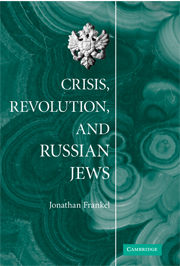Book contents
- Frontmatter
- Contents
- Acknowledgments
- Introduction
- PART I NEW DYNAMICS?
- 1 Crisis as a Factor in Modern Jewish Politics, 1840 and 1881–1882
- 2 Jewish Politics and the Press: The “Reception” of the Alliance Israélite Universelle (1860)
- PART II REVOLUTION AND WAR (1905–1921)
- PART III IDEOLOGICAL CONFLICT AND CONTINUITY
- PART IV OVERSEAS
- PART V HISTORY AND THE HISTORIANS
- Index
2 - Jewish Politics and the Press: The “Reception” of the Alliance Israélite Universelle (1860)
Published online by Cambridge University Press: 07 August 2009
- Frontmatter
- Contents
- Acknowledgments
- Introduction
- PART I NEW DYNAMICS?
- 1 Crisis as a Factor in Modern Jewish Politics, 1840 and 1881–1882
- 2 Jewish Politics and the Press: The “Reception” of the Alliance Israélite Universelle (1860)
- PART II REVOLUTION AND WAR (1905–1921)
- PART III IDEOLOGICAL CONFLICT AND CONTINUITY
- PART IV OVERSEAS
- PART V HISTORY AND THE HISTORIANS
- Index
Summary
It has become something of a truism by now to argue that the emergence of the Jewish press in the mid-nineteenth century was a development of the most crucial importance in modern Jewish history. This perception owes much to such innovative works as Eli Lederhendler's The Road to Modern Jewish Politics, which described the role played by a number of papers – Hamagid, edited by David Gordon and Hameliz edited by Aleksandr Tsederbaum, for example – as a pivotal factor in the consolidation of an alternative, modern, leadership able eventually to challenge the traditional Jewish elites within the Russian empire. In his recent history of the Jewish Chronicle David Cesarani summed up what is today a widely accepted view: “By linking Jews around the world and defining their common concerns, the Jewish press played a primary role in the evolution of a modern form of Jewish solidarity and ethnic identity.”
Curiously enough, this weighty emphasis on the press as a key factor in shaping Jewish identity and politics in the modern era appears to be very much a phenomenon of recent origin. A glance at the classic works of Jewish historiography by Graetz, Dubnov and Baron reveals that they virtually ignored the emergence of the Jewish press as a topic in its own right. Jost paid the subject only marginally more attention; and even Ettinger devoted no more than half a page in his history to the press per se.
- Type
- Chapter
- Information
- Crisis, Revolution, and Russian Jews , pp. 32 - 54Publisher: Cambridge University PressPrint publication year: 2008



